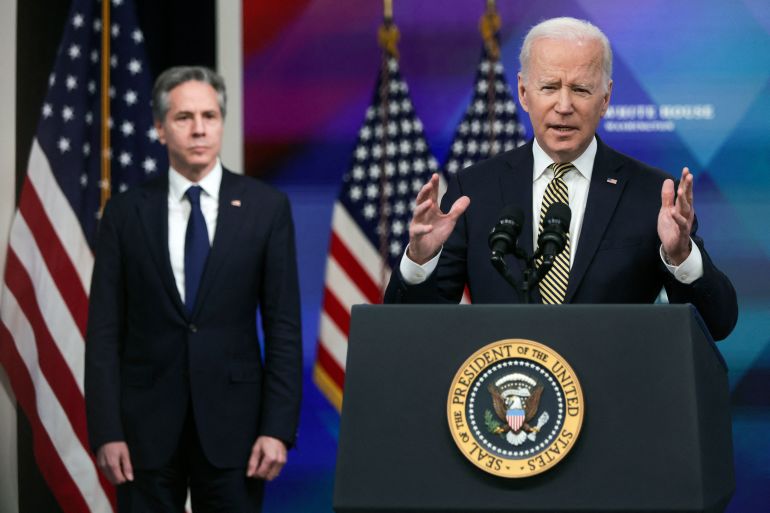The US needs to be coherent in its response to statelessness
The Biden administration should be fighting against this grave human rights violation both at home and abroad.

In April, the United States sanctioned three Nicaraguan judges for their role in stripping more than 300 political dissidents of their citizenship and leaving many of them stateless.
“The United States is taking further action to hold accountable perpetrators of the Nicaraguan regime’s repressive actions,” US Secretary of State Antony Blinken said in a press statement.
Nicaragua’s government, led by President Daniel Ortega and Vice President Rosario Murillo, had been criticised by the United Nations and human rights groups like Amnesty International for using the judiciary to target political opponents.
“We will continue to use available diplomatic and economic tools to promote accountability for the Ortega-Murillo regime’s abuses,” Blinken added.
The Biden administration’s firm and timely response to the Nicaraguan regime’s attempt at turning statelessness into a weapon against dissent is undoubtedly commendable. But, regrettably, this principled stance remains in sharp contrast with its continued failure to fulfil the promises it made to more than 200,000 stateless people in the US. This includes many stateless individuals who, just like the Nicaraguan dissidents Blinken is now trying to protect, have been stripped of their citizenship because they opposed oppressive regimes in their “home” countries.
In 2021, the US Department of Homeland Security (DHS) announced that it would “adopt a definition of statelessness for immigration purposes and enhance protections for stateless individuals living in the United States”. In April 2022, Secretary of Homeland Security Alejandro Mayorkas affirmed this commitment during an appearance on PBS NewsHour, noting that his department would “move with the urgency that the vulnerabilities warrant” and aimed “to deliver on that this year, this fiscal year”.
Stateless people are those, like the (formerly) Nicaraguan activists, who no government considers its citizens.
Every stateless person has their own unique story about how they ended up in that situation, but geopolitical upheavals like the disbanding of the Soviet Union or crises like the war in Ukraine are common causes. Some have been left stateless because they were abroad at the time of a regime change in their home country and the newly formed state refused to recognise them as one of its citizens. Others became stateless when the autocratic governments of their home countries stripped all members of the ethnic or religious minority community they belong to of their citizenship.
Whatever the cause, statelessness puts people in a bureaucratic limbo that robs them of the chance to lead a full life. As they do not have any travel documents, they often end up separated from their relatives in other countries for decades. Even if they demand to be “deported” no country agrees to take them so they cannot leave. Some may lack identity papers, work authorisation and even the ability to access healthcare.
In his statement on the sanctions introduced against the Nicaraguan judges, Secretary Blinken acknowledged that Nicaraguan dissidents in question have a “basic right to citizenship”. Unfortunately, he has not yet moved to help 200,000 stateless people residing in his own country exercise this “basic right”.
Today, stateless people in the US still have very few rights and their future in the country remains uncertain. Stateless people in the US demand concrete, immediate action from the government of their adopted home. The Biden administration should fulfil the promises it made to stateless people more than two years ago and urgently come up with a permanent and all-inclusive solution to statelessness in the country.
The US immigration law is not fit for purpose when it comes to dealing with statelessness in a humane, efficient and timely manner. Thus, if it is serious about ending statelessness in the US, the government first needs to build a specific legal framework to help and protect stateless people. Congress could take the first step towards building this much-needed framework by passing the Stateless Protection Act, which was introduced by Senator Ben Cardin and Representative Jamie Raskin in December 2022.
I was pleased to see Secretary Blinken acknowledge the “basic right to citizenship” and show that the US, seen as a beacon of freedom by many, is ready to defend Nicaraguan dissidents against statelessness. But to demonstrate Biden’s America really cares about eradicating this grave human rights violation, he also needs to help those stateless people who already made the US their home. In other words, when it comes to statelessness, the Biden administration needs to be coherent and stick to its word.
The views expressed in this article are the author’s own and do not necessarily reflect Al Jazeera’s editorial stance.
